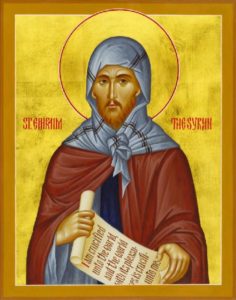About Hannah Stone, our new Poet Theologian in Virtual Residence
Hannah has lived in Leeds for 30 years and in ‘normal’ circumstances facilitates a number of local poetry events within the community as well as teaching for the Open University. She has published four volumes of poetry since 2014 and collaborates with composers and other poets. As Hannah Hunt she was an academic theologian specialising in the spirituality of the Eastern Christian Church, from the monastic communities of the Desert Fathers onwards. Having already worked with LCI with workshop support for their recent poetry anthology, she is delighted to have been appointed as Poet Theologian in Virtual Residence. Hannah will be contributing a weekly blog entry reflecting on the Covid19 situation via the medium of poetry and is looking forward to engaging with LCI members.
Poetry and Theology
Today I’m going to suggest that poetry and theology are inextricably linked. Poetry uses metaphors and similes, ways of talking about things indirectly but in a powerfully present way. The word ‘poetry’ comes from a Greek word meaning to make or create. And God is a creator; we only have to look at the start of Genesis to learn that.
Many fine poets are and have been people of faith, a fair few also ordained: Rowan Williams, Gerald Manley Hopkins, R. S. Thomas spring to mind, also John Donne and George Herbert, two of the seventeenth century Metaphysical poets. Christianity is full of poetic language. It is based on belief in Jesus, the Son of God, who is described by many different metaphors – the Light of the World, the True Vine, the Lamb of God.
There’s been talk recently about the principles behind relaxing lockdown needing to adhere to Five Pillars, an image which immediately reminded me of the Five Pillars that underpin the Muslim Faith, much in mind as our Muslim sisters and brothers enter their period of fasting. We’ve also heard the metaphor of fighting used to describe the attempt to get to grips with CV19, with ‘front line staff’ evoking the troops leading an army into battle. We are urged to continue to comply with the requirements of social distancing. Here’s a prose poem I wrote early in lockdown, in which the metaphor of obedience presented itself.
‘Adapting’
For five days I was frantic; my mind surging yet pulled back by the jesses of physical stasis. After ten days my thoughts were fluttering like trapped birds. Complaints were posted on a community website about people getting too close to each other on the bridal path. This felicitous homophone prompted a reflection on what poverty, chastity and obedience might mean under social distancing. Men in knotted ties promulgated a new triumvirate of vows for CV19 community. Stay Home. Protect the NHS. Save Lives. After 15 days I switched off my phone and my words came home to roost.
I’ll close with a short extract from St Ephrem’s Hymn on the Faith number 31. A fourth century deacon, St Ephrem lived and worked in what is now Turkey. He wrote thousands of verse homilies and hymns in exquisite poetry, in his native tongue, Syriac, a language closely related to the Aramaic Jesus himself would have used. His poetry was his theology, and vice versa.
 Let us give thanks to God
Let us give thanks to God
Who clothed himself in the names of the body’s various parts:
Scripture refers us to His ‘ears’
To teach us that He listens to us;
It speaks of His ‘eyes,’
To show that he sees us …
Response: Blessed is He who has appeared to our human race under so many metaphors.
I wonder what images will present themselves to us this week, as we strive to understand what’s going on. How does language help us make sense of things? You can submit a comment below or email us at [email protected]


I definitely feel uncomfortable with war analogies, not least because they seem to chime with seeing other countries, like China, as an enemy rather than a fellow traveller.
The image of sailing on rough seas speaks to me. When the waves are crashing and the ship tossing, sometimes crew members can only go below decks, batten down the hatches and roll with it.
So this seems like a time when God is in the darkness of the hold with us.
The point about war analogies is very well made. Sailing on rough seas and going below deck to batten down seem much more fitting images for the present situation. Yes.